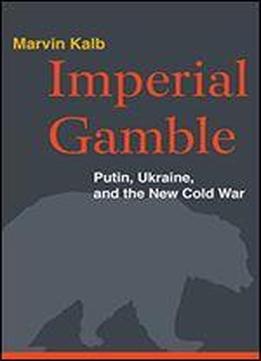
Imperial Gamble: Putin, Ukraine, And The New Cold War
by Marvin Kalb /
2015 / English / PDF
5.7 MB Download
Vladimir Putin's invasion of Crimea in March 2014 stunned the world. Shortly thereafter, "little green men" armed by Russia occupied the southeast corner of Ukraine. What was Putin up to? How far would he go? The United States and its Western allies imposed strict economic sanctions on Russia, naively hoping Putin would be intimidated and change his policy. The US also removed its military option from the crisis, stressing that it would not fight Russia over Ukraine.This sharp deterioration in East-West relations raised basic questions about the policies of Vladimir Putin and the future of Russia. Is Putin's ultimate goal the dissolution of the North Atlantic Treaty Organization (NATO) and the end of Western influence and power in Eastern Europe? Or is he intent on reconstituting the old Russian and Soviet empires and, in the process, challenge Western interests throughout Europe? Or are his goals more modest - simply to retain Russian influence and power in Ukraine? Author Marvin Kalb has lived in Russia for more than five years and visited Russia dozens of times. He was the CBS correspondent in Russia in the late 1950s, reporting directly to Edward R. Murrow, and he served as Moscow bureau chief in the 1960s, when he covered the Berlin crises and the Cuban missile crisis. In his forteenth major book, Kalb argues that, contrary to conventional wisdom, Putin did not "suddenly" decide to invade Crimea and then instigate a pro-Russian rebellion in eastern Ukraine. Once the Ukrainians rose in angry defiance in late 2013, Putin knew he would have to take military action to stop Ukraine's swing to the West. It was just a matter of time. The "Maidan Square" demonstrations led Putin to the conclusion that the Ukrainian upheaval posed an existential threat to Russia, and they had to be challenged.Imperial Gamble examines how Putin reached that conclusion by taking a critical look at the recent political history of post-Soviet Russia and Ukraine. It also journeys deeper into the Russian past to more fully explain the roots of Russian nationalism and the reason why the Russian people support his controversial actions in Ukraine. Kalb argues that the post-cold war world today hangs on the resolution of the Ukraine crisis. So long as it is treated as a problem to be resolved by Russia, on the one side, and the United States and Europe, on the other, it will remain a danger zone with global consequences. The only sensible solution lies in both Russia and Ukraine recognizing that their futures are irrevocably linked by the geography, power, politics, and history that Kalb brings to life in Imperial Gamble.











